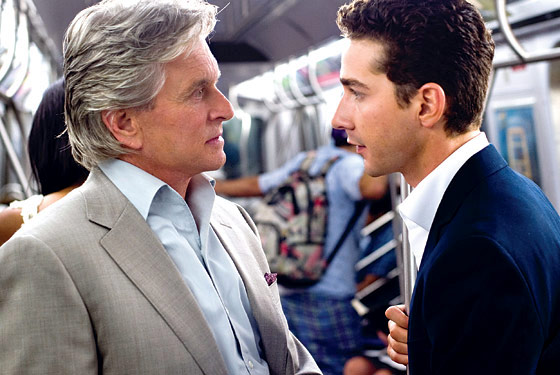
The best thing in Oliver Stone’s Wall Street: Money Never Sleeps is a brief overture in which Michael Douglas’s Gordon Gekko—his face obscured until the last second to build anticipation—emerges from prison after eight years to find no one waiting. Douglas registers the emptiness, breathes in and out, takes in the space. Then a look comes into his eyes: calculating, predatory. It says that Gekko’s will is intact, that what he does now will be worth watching.
Vain hope. Wall Street: Money Never Sleeps might be the movie-TV crossover point, wherein the sequel to an influential eighties motion picture is so loaded with characters and crosscurrents that we wonder why it isn’t a thirteen-hour cable mini-series instead of an impacted two-hour mess. The film is like my portfolio: full of promise, with minuscule returns.
And yet … this is the rare sequel that has a good reason to exist. In Wall Street (1987), Stone came up with a brilliant trick, putting lefty critiques of capitalism into the mouth of his Über-capitalist villain—as boasts. And lo, impressionable young people loved Gekko’s ease with his vast wealth, his lack of shame. Stone and Douglas were reportedly surprised they’d created not just a monster but a role model. So bringing Gekko back makes all kinds of sense: Let’s see what he makes of an even more evolved, more insidious breed of predators. Will he fight them or join them or find some other path to the mother lode?
It’s damn hard to diagram. After the overture, Gekko stays offscreen for most of the first act, in which we meet the clean-cut male ingénue, Jacob (Shia LaBeouf). He’s engaged to Gekko’s estranged daughter, Winnie (Carey Mulligan), who runs an investigative website. More than that, he’s out for revenge. He worked for a venerable firm modeled on Bear Stearns and Lehman Brothers—in other words, it went down hard. So did its director, Jacob’s mentor, a dolorous Care Bear played with incomparable gravity by Frank Langella. It was the wicked Churchill Schwartz (read: Goldman Sachs) partner Bretton James (Josh Brolin) who circulated rumors about the firm, starting the panic—and then finished the old man off before the Federal Reserve Board. Jacob wants blood, and if he has to be counseled by Gordon Gekko, well … to whom did Clarice Starling go for help?
In prospect it’s all so enticing: the Machiavellian stratagems; the tumultuous father-daughter reunions; the financial collapse of 2008; a cameo by Charlie Sheen. Apart from the stray bubble drifting past the camera to reinforce the idea that this is, you know, a bubble economy, there are no unintentional laughs, and the cast is ready to go for broke. Eli Wallach is around as an ancient gnome who’s the black, shriveled heart of Wall Street, and Brolin, lit from below, pitches his voice somewhere between street thug and silky satanic overlord. He sneers at Gekko’s insider-trading conviction: “Nobody needs inside information anymore to get rich.”
But even before the air goes out of the movie (about halfway through) there are off notes. Gekko gives a speech about greed, and students drink in his now-conventional wisdom about the overextension of credit and an economy built on “moving money around in circles.” Jacob rebukes his mother (Susan Sarandon) for giving up nursing to sell real estate, a scene that needs more buildup or follow-through or something. By the time Bretton challenges Jacob to a motorcycle race on the day the market plunges, the film is on life support. The revenge plot falls by the wayside; Gekko pulls a fast one; Jacob and Winnie hit the skids; Jacob mopes.
Does Stone believe that Lehman Brothers fell because of rumors started by a rival? What’s behind the alternative-energy company that Jacob labors to keep alive? Gekko asks Jacob if he wonders why Winnie hooked up with a Wall Street guy when she despises her dad—and it’s a great question! (Stone must think he has done his job merely by raising it.) The movie has about five endings, the last one the corniest.
As with many recent Stone projects, it’s hard to tell what the focus is supposed to be. Stone has said he wanted to prove definitively that Gekko’s “greed is good” speech was wrong, but Douglas is nowhere near as devilish (or as vivid) this time around. Compounding the confusion is the Sheen cameo: He approaches Gekko at a party with a gorgeous woman on each arm, having gone on to make a fortune. The scene is a joke on Sheen’s persona, and it’s wonderful in all kinds of ways—except the one that matters. In Wall Street, Bud sacrificed his own career for an ideal. And then he became … rich, sleazy Charlie Sheen? For all Stone’s vaunted political commitment, does he believe in anything beside the infinite corruptibility of humankind?

What could be more awkward for a political progressive—Davis Guggenheim, who made An Inconvenient Truth—than to open a documentary with the admission that he betrays his ideals every morning, when he drives past his local school in the Washington, D.C., area and drops off his children at a private institution? What could be riskier to his country’s political future (as he sees it) than to conclude that the villain of his story is a union, the American Federation of Teachers, that also happens to be one of the Democratic Party’s most generous sources of contributions? Waiting for “Superman” has a measured tempo and a humanistic spirit, but you can feel the director’s struggle to keep it evenhanded. I especially felt it because my own response was unmeasured: This is one of the most galvanizing documentaries I’ve ever seen.
The clunky title comes from Guggenheim’s most charismatic figure: Geoffrey Canada, the president and CEO of the Harlem Children’s Zone, who laughs at himself for his childlike dreams of a comic-book savior, and for thinking, way back in 1975, when he got out of grad school at Harvard, that he’d have the country’s problems solved by, oh, ’77, ’78. After Canada’s wry recollections, Guggenheim lets roll a clip reel of more than a half-century of presidents, from George H.W. Bush’s vow to be “the education president” to his son’s teaming up with Teddy Kennedy to pass “No Child Left Behind” on the premise that “childrens [sic] do learn.”
But this is not a movie about presidents, and every statistic—there are many—connects with the story of a child: brooding Anthony in D.C., darlingly open Daisy in L.A., sweet-tempered Bianca in Harlem, and others. They want to go to school, but the schools to which they’re headed are the ones where maybe three of every 100 kids will graduate with the minimum requirements for college. They have parents who work desperately to get them a decent education, but their dreams of going to a magnet or charter school rest on balls or slips of paper pulled at random, on crap shoots with dismaying odds.
Here are some of the revelations in Waiting for “Superman.” Failing schools can’t always be blamed on failing neighborhoods; failing neighborhoods can be blamed on failing schools. The U.S. ranks 25th out of 30 developed countries in math proficiency, but first in how proficient its citizens think they are. And here’s the most amazing statistic: Under the AFT contract, only one in 2,500 U.S. teachers with tenure (typically granted after two years) will lose his or her job, and the cost and time to fire him or her will be staggering.
Guggenheim does point out that the union has protected the underpaid and overworked, and unlike Madeleine Sackler in her recent film, The Lottery, about the battle over charter schools, he doesn’t float accusations of corruption. But Guggenheim arrives at the same place. Every time an administrator like D.C.’s Michelle Rhee or Pittsburgh’s Bill Strickland comes along with a plan to weed out the miserable teachers, there she is, AFT president Randi Weingarten, telling the media that her critics are all self-serving. Ladies and gentlemen, I give you Lex Luthor.
The image I’ll take away with me is of Anthony, whose father died of a drug overdose, explaining that he doesn’t want to leave his friends and go to a boarding school but will because “I want my kid to have better than what I had.” He’s worried about the next generation, because he has already lost his own childhood. The website (waitingforsuperman.com) to contact appears many times in the closing credits. A word of caution: Once you see Waiting for “Superman,” you’ll have no excuse for letting things stand.
See Also
John Heilemann on the Debate Over Waiting for “Superman”
Wall Street: Money Never Sleeps
Twentieth Century Fox. PG-13.
Waiting for “Superman”
Paramount Vantage. PG.
E-mail: filmcritic@newyorkmag.com.
